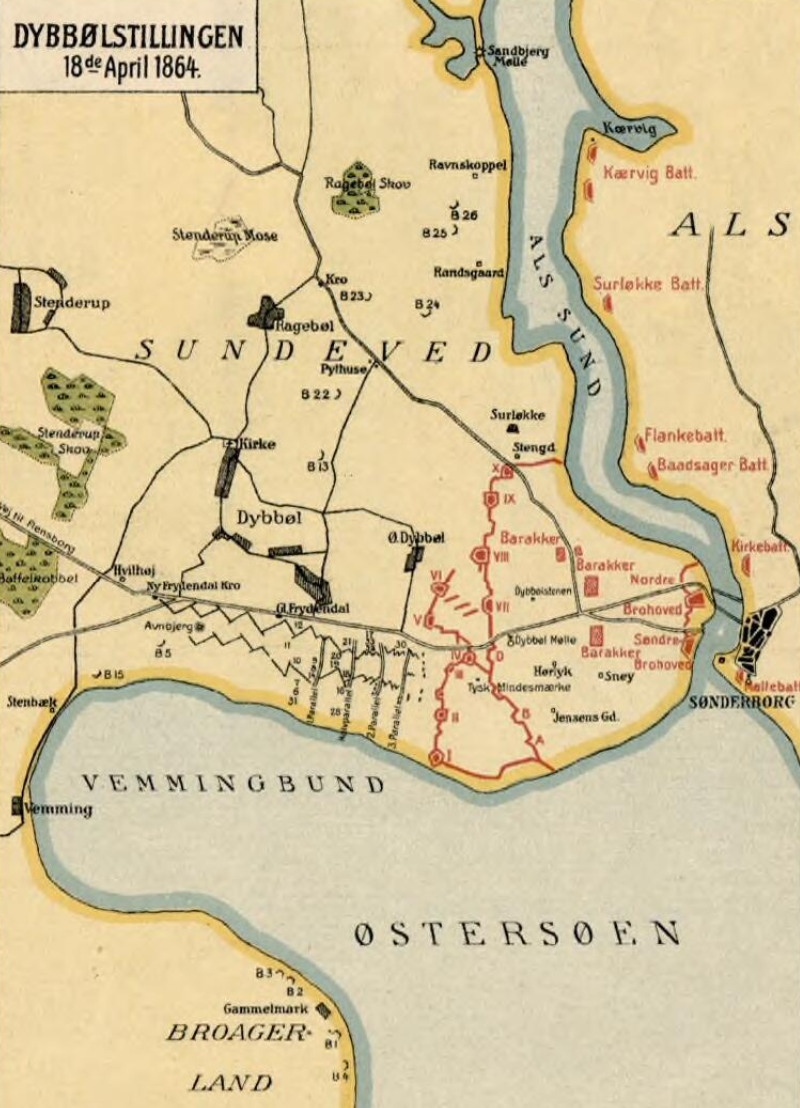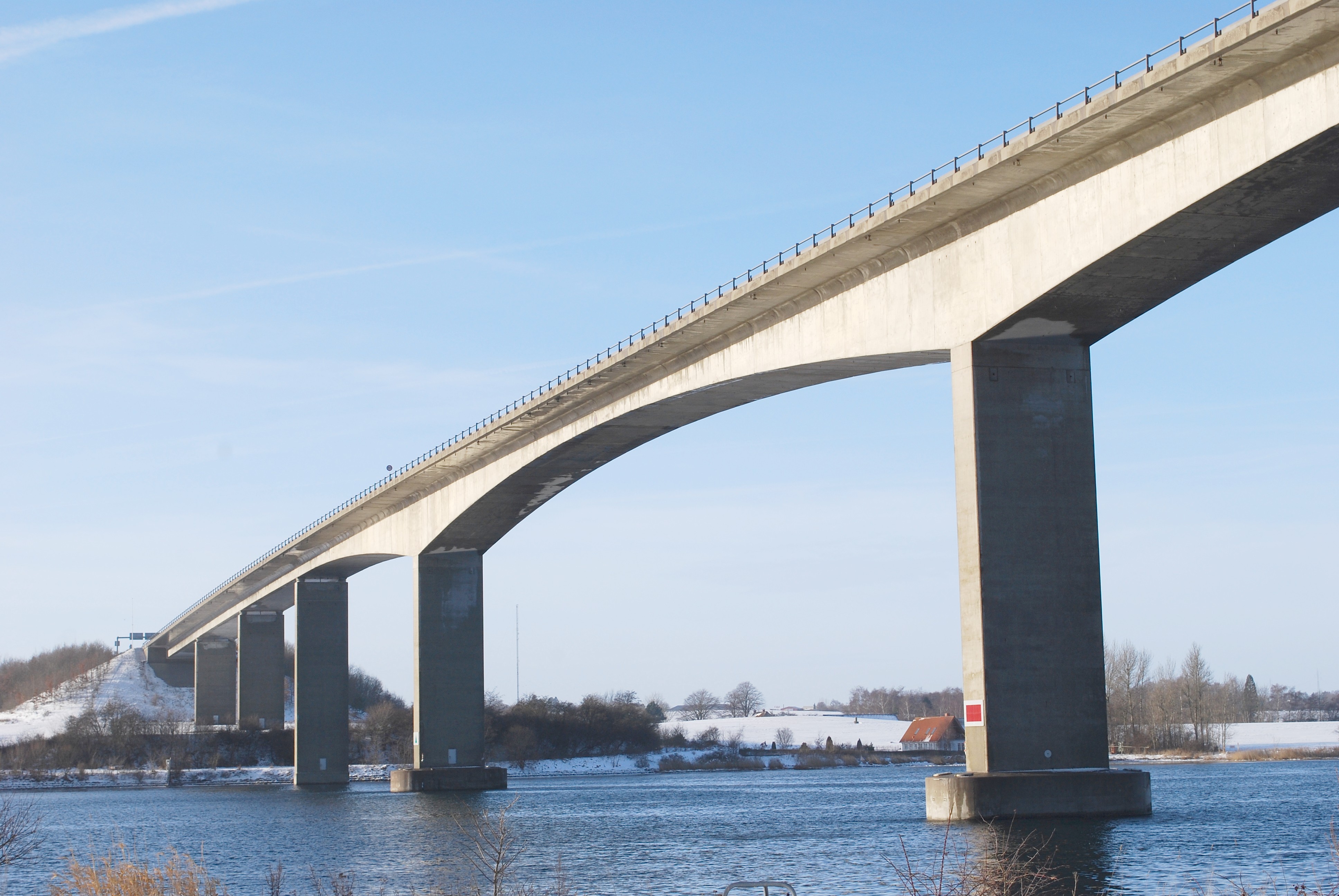|
Battle Of Dybbøl
The Battle of Dybbøl ( da, Slaget ved Dybbøl; german: Erstürmung der Düppeler Schanzen) was the key battle of the Second Schleswig War, fought between Denmark and Prussia. The battle was fought on the morning of 18 April 1864, following a siege that began on 2 April. Denmark suffered a severe defeat which – with the Prussian capture of the island of Als – ultimately decided the outcome of the war, forcing Danish cession of the duchies of Schleswig and Holstein. Background Following the annexation of the Duchy of Schleswig in November 1863 by Danish king Christian IX (who was also the Duke of Schleswig), Prussia and Austria invaded Jutland in January 1864. The defending Danish infantry was equipped with French M1822 percussion muskets converted to Minié rifling and with Tapriffel M1864s. The Prussian army used the Dreyse needle-gun, a breech-loading rifle. Dybbøl had also been the site of a battlefield in the First Schleswig War. Dybbøl fort, also called 'Dybb ... [...More Info...] [...Related Items...] OR: [Wikipedia] [Google] [Baidu] |
Second Schleswig War
The Second Schleswig War ( da, Krigen i 1864; german: Deutsch-Dänischer Krieg) also sometimes known as the Dano-Prussian War or Prusso-Danish War was the second military conflict over the Schleswig-Holstein Question of the nineteenth century. The war began on 1 February 1864, when Prussian and Austrian forces crossed the border into the Danish fief Schleswig. Denmark fought the Kingdom of Prussia and the Austrian Empire. Like the First Schleswig War (1848–1852), it was fought for control of the duchies of Schleswig, Holstein and Lauenburg. Succession disputes concerning the duchies arose when the Danish king died without an heir acceptable to the German Confederation. The war started after the passing of the November Constitution of 1863, which tied Duchy of Schleswig more closely to the Danish kingdom, which was viewed by the German side as a violation of the London Protocol. The war ended on 30 October 1864, with the Treaty of Vienna and Denmark's cession of the Duchies ... [...More Info...] [...Related Items...] OR: [Wikipedia] [Google] [Baidu] |
Alssund
The Alssund is the narrow strait between Als island and the mainland of Jutland, in Denmark. External links * See also *Geography of Denmark Denmark is a Nordic country located in Northern Europe. It consists of the Jutland Peninsula and several islands in the Baltic Sea, referred to as the Danish Archipelago. Denmark is located southwest of Sweden and due south of Norway and is ... Straits of Denmark Geography of Sønderborg Municipality Baltic Sea {{SouthernDK-stub ... [...More Info...] [...Related Items...] OR: [Wikipedia] [Google] [Baidu] |
Schleswig
The Duchy of Schleswig ( da, Hertugdømmet Slesvig; german: Herzogtum Schleswig; nds, Hartogdom Sleswig; frr, Härtochduum Slaswik) was a duchy in Southern Jutland () covering the area between about 60 km (35 miles) north and 70 km (45 mi) south of the current border between Germany and Denmark. The territory has been divided between the two countries since 1920, with Northern Schleswig in Denmark and Southern Schleswig in Germany. The region is also called Sleswick in English. Unlike Holstein and Lauenburg, Schleswig was never a part of the German Confederation. Schleswig was instead a fief of Denmark, and its inhabitants spoke Danish, German, and North Frisian. Both Danish and German National Liberals wanted Schleswig to be part of a Danish or German national state in the 19th century. A German uprising in March 1848 caused the First Schleswig War which ended in 1852. The Second Schleswig War (1864) ended with the three duchies being governed jointly b ... [...More Info...] [...Related Items...] OR: [Wikipedia] [Google] [Baidu] |
Treaty Of Vienna (1864)
The Treaty of Vienna (; ) was a peace treaty signed on 30 October 1864 in Vienna between the Austrian Empire, the Kingdom of Prussia, and the Kingdom of Denmark. The treaty ended the Second War of Schleswig. Denmark ceded the Duchy of Schleswig (except for the island of Ærø, which remained Danish) the Duchy of Holstein and the Duchy of Lauenburg. They would be jointly governed by Prussia and Austria in a condominium. A subsequent treaty between Austria and Prussia on August 14, 1865 known as the Gastein Convention provided that Prussia would administer Schleswig and Austria would similarly govern Holstein. Austria also sold its rights over Lauenburg to Prussia. Disputes over the administration of Schleswig and Holstein would lead to the 1866 Austro-Prussian War. When that war was over, Prussia annexed Schleswig and Holstein. See also * List of treaties * Schleswig-Holstein Question Schleswig-Holstein (; da, Slesvig-Holsten; nds, Sleswig-Holsteen; frr, Slaswik-Holstiinj ... [...More Info...] [...Related Items...] OR: [Wikipedia] [Google] [Baidu] |
Eider (river)
The Eider (german: Die Eider; da, Ejderen; Latin: ''Egdor'' or ''Eidora'') is the longest river in the German state of Schleswig-Holstein. The river starts near Bordesholm and reaches the southwestern outskirts of Kiel on the shores of the Baltic Sea, but flows to the west, ending in the North Sea. The lower part of the Eider was used as part of the Eider Canal until that canal was replaced by the modern Kiel Canal. In the Early Middle Ages the river is believed to have been the border between the related Germanic tribes, the Jutes and the Angles, who along with the neighboring Saxons crossed the North Sea from this region during this period and settled in England. During the High Middle Ages the Eider was the border between the Saxons and the Danes, as reported by Adam of Bremen in 1076. For centuries it divided Denmark and the Holy Roman Empire. Today it is the border between Schleswig, Holstein and Eiderland, the northern and southern parts, respectively, of the modern Ge ... [...More Info...] [...Related Items...] OR: [Wikipedia] [Google] [Baidu] |
Battle Of Heligoland (1864)
The Battle of Heligoland (or Helgoland) was fought on 9 May 1864, during the Second Schleswig War, between a Danish squadron led by Commodore Edouard Suenson and a joint Austro-Prussian squadron commanded by the Austrian Commodore Wilhelm von Tegetthoff. The action came about as a result of the Danish blockade of German ports in the North Sea; the Austrians had sent two steam frigates, and , to reinforce the small Prussian Navy to help break the blockade. After arriving in the North Sea, Tegetthoff joined a Prussian aviso and a pair of gunboats. To oppose him, Suenson had available the steam frigates and and the corvette . On the morning of 9 May, the two squadrons encountered each other off the island of Heligoland, then controlled by neutral Great Britain. Tegetthoff attacked with his two frigates while the slower Prussian vessels lagged behind, unable to effectively engage the Danish warships. Tegetthoff's flagship, ''Schwarzenberg'', bore the brunt of the Danish gunfi ... [...More Info...] [...Related Items...] OR: [Wikipedia] [Google] [Baidu] |
Düppel Schlachtfeld
Düppel can refer to: * The German name for Dybbøl, a town in Denmark famed for an 1864 battle * Düppel (Berlin), a forest and neighbourhood in Berlin, Germany * Chaff (radar countermeasure) Chaff, originally called Window by the British and ''Düppel'' by the Second World War era German Luftwaffe (from the Berlin suburb where it was first developed), is a radar countermeasure in which aircraft or other targets spread a cloud of ..., historically known as Düppel after the neighborhood in which it was developed during World War 2 {{disambig ... [...More Info...] [...Related Items...] OR: [Wikipedia] [Google] [Baidu] |
Battle Of Als
The Battle of Als ( da, Slaget om Als; german: Übergang nach Alsen) was fought on 29 June 1864 during the Second Schleswig War between Denmark and Prussia. It was the last major engagement of the war, as the Prussians under General Herwarth von Bittenfeld secured the island of Als – occupied by 9,000 Danish troops, including the garrison of Dybbøl which had retreated there – in a night attack masterminded by the Chief of Staff (later Field Marshal) Leonhard Graf von Blumenthal. Background On May 12, peace talks began in London. The Danes were offered by the Prussians a border that was close to today's, but it was rejected by the government in Copenhagen. Prussia also proposed a referendum in Schleswig on where the border would go, but it was also rejected. Eventually, the inevitable collapse of the negotiations was due to the defeat at the Battle of Dybbøl on April 18. The Danish negotiators with Prime Minister D.G. Monrad spearheaded the demand for a demarcation at ... [...More Info...] [...Related Items...] OR: [Wikipedia] [Google] [Baidu] |
Charles Van De Velde
Charles is a masculine given name predominantly found in English and French speaking countries. It is from the French form ''Charles'' of the Proto-Germanic name (in runic alphabet) or ''*karilaz'' (in Latin alphabet), whose meaning was "free man". The Old English descendant of this word was '' Ċearl'' or ''Ċeorl'', as the name of King Cearl of Mercia, that disappeared after the Norman conquest of England. The name was notably borne by Charlemagne (Charles the Great), and was at the time Latinized as ''Karolus'' (as in ''Vita Karoli Magni''), later also as '' Carolus''. Some Germanic languages, for example Dutch and German, have retained the word in two separate senses. In the particular case of Dutch, ''Karel'' refers to the given name, whereas the noun ''kerel'' means "a bloke, fellow, man". Etymology The name's etymology is a Common Germanic noun ''*karilaz'' meaning "free man", which survives in English as churl (< Old English ''ċeorl''), which developed its ... [...More Info...] [...Related Items...] OR: [Wikipedia] [Google] [Baidu] |
Louis Appia
Louis Paul Amédée Appia (13 October 1818 – 1 May 1898) was a Swiss surgeon with special merit in the area of military medicine. In 1863 he became a member of the Geneva "Committee of Five", which was the precursor to the International Committee of the Red Cross. Six years later he met Clara Barton, an encounter which had significant influence on Clara Barton's subsequent endeavours to found a Red Cross society in the United States and her campaign for an accession of the US to the Geneva Convention of 1864. Education and career as a field surgeon Appie was born in Frankfurt and baptised Louis Paul Amadeus Appia. Appia's parents, Paul Joseph Appia and Caroline Develey, originally came from Piedmont. His father, who had been a University student in Geneva, nevertheless became an evangelical pastor in 1811 in Hanau near Frankfurt am Main. Louis was the third of six children. He went to Gymnasium (high school) in Frankfurt and at eighteen gained the ''Hochschulreife'' diploma in Ge ... [...More Info...] [...Related Items...] OR: [Wikipedia] [Google] [Baidu] |
Red Cross
The International Red Cross and Red Crescent Movement is a Humanitarianism, humanitarian movement with approximately 97 million Volunteering, volunteers, members and staff worldwide. It was founded to protect human life and health, to ensure respect for all human beings, and to prevent and alleviate human suffering. Within it there are three distinct organisations that are legally independent from each other, but are united within the movement through common basic principles, objectives, symbols, statutes and governing organisations. History Foundation Until the middle of the nineteenth century, there were no organized or well-established army nursing systems for casualties, nor safe or protected institutions, to accommodate and treat those who were wounded on the battlefield. A devout Calvinism, Calvinist, the Swiss businessman Jean-Henri Dunant traveled to Italy to meet then-French emperor Napoleon III in June 1859 with the intention of discussing difficulties in conducting ... [...More Info...] [...Related Items...] OR: [Wikipedia] [Google] [Baidu] |







